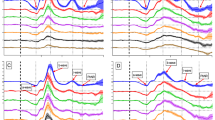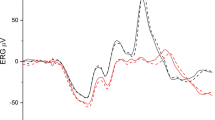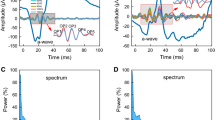Abstract
This study characterizes differences in human ERGs based on ocular pigmentation. Light- and dark-adapted luminance-response (LR) series for a-, b- and i-waves and light-adapted oscillatory potentials (OPs) were recorded in 14 healthy volunteers (7 blue-eyed Caucasians; 7 brown-eyed Asians, aged 20–22 years). Amplitude interpolations were by logistic growth (Naka-Rushton), Gaussian or the combined ‘photopic hill’ functions. Implicit times (IT) for dark-adapted a- and b-waves, and for light-adapted a-, b- and i-waves were earlier in the blue-eyed group than in the brown-eyed group across all flash strengths (P < 0.05). For dark-adapted ERGs, saturated a-wave amplitude was larger for blue eyes (397 vs. 318 μV, P < 0.05) as was the a-wave to strong flash (10 cd·s/m2; 357 vs. 293 μV, P < 0.05) and the b-wave to ISCEV standard 0.01 (354 vs. 238 μV, P < 0.05). Light-adapted b-waves for midrange flash stimuli were much larger for the blue-eyed group (photopic hill, Gaussian peak: 155 vs. 82 μV, P < 0.001) with no difference in saturated amplitudes. Similarly, interpolated i-wave amplitudes were larger (48 vs. 18 μV, P < 0.01). For a light-adapted 2.6 stimulus, a- and b-waves were larger for the blue-eyed group (52 vs. 39 μV; 209 vs. 133 μV, P < 0.01) as were OP4 and OP5 (37.2 vs. 15.6 μV; 47.5 vs. 22.2 μV, P < 0.01), but OP1-OP3 did not differ. ERGs have shorter ITs in people with blue irides than in those with dark pigmentation. Amplitude differences are highly non-linear and substantially larger from eyes with light pigmentation for components thought to be associated with the OFF retinal pathways.










Similar content being viewed by others
References
Marmor MF, Fulton AB, Holder GE, Miyake Y, Brigell M, Bach M (2009) ISCEV standard for full-field clinical electroretinography (2008 update). Doc Ophthalmol 118 (1):69–77 (www.iscev.org)
Wali N, Leguire LE (1992) Fundus pigmentation and the dark-adapted electroretinogram. Doc Ophthalmol 80(1):1–11
Wali N, Leguire LE (1993) Fundus pigmentation and the electroretinographic luminance-response function. Doc Ophthalmol 84(1):61–69
Krill AE, Lee GB (1963) The electroretinogram in albinos and carriers of the ocular albino trait. Arch Ophthalmol 69:32–38
Russell-Eggitt I, Kriss A, Taylor DS (1990) Albinism in childhood: a flash VEP and ERG study. Br J Ophthalmol 74(3):136–140
Nusinowitz S, Sarraf D (2008) Retinal function in X-linked ocular albinism (OA1). Curr Eye Res 33:789–803
Tomei F, Wirth A (1978) The electroretinogram of albinos. Vision Res 18(10):1465–1466
Weiter JJ, Delori FC, Wing GL, Fitch KA (1985) Relationship of senile macular degeneration to ocular pigmentation. Am J Ophthalmol 99(2):185–187
Weiter JJ, Delori FC, Wing GL, Fitch KA (1986) Retinal pigment epithelial lipofuscin and melanin and choroidal melanin in human eyes. Invest Ophthalmol Vis Sci 27(2):145–152
Robins AH (1973) Skin melanin content in blue-eyed and brown-eyed subjects. Hum Hered 23(1):13–18
Birch DG, Anderson JL (1992) Standardized full-field electroretinography. Normal values and their variation with age. Arch Ophthalmol 110(11):1571–1576
Westall CA, Panton CM, Levin AV (1998) Time courses for maturation of electroretinogram responses from infancy to adulthood. Doc Ophthalmol 96(4):355–379
Weleber RG (1981) The effect of age on human cone and rod ganzfeld electroretinograms. Invest Ophthalmol Vis Sci 20(3):392–399
Perlman I, Meyer E, Haim T, Zonis S (1984) Retinal function in high refractive error assessed electroretinographically. Br J Ophthalmol 68(2):79–84
Westall CA, Dhaliwal HS, Panton CM, Sigesmun D, Levin AV, Nischal KK, Heon E (2001) Values of electroretinogram responses according to axial length. Doc Ophthalmol 102(2):115–130
Seddon JM, Sahagian CR et al (1990) Evaluation of an iris color classification system. The Eye Disorders Case-Control Study Group. Invest Ophthalmol Vis Sci 31(8):1592–1598
Naka KI, Rushton WA (1966) S-potentials from colour units in the retina of fish (cyprinidae). J Physiol 185(3):536–555
Severns ML, Johnson MA (1993) The care and fitting of Naka-Rushton functions to electroretinographic intensity-response data. Doc Ophthalmol 85(2):135–150
Hamilton R, Bees MA, Chaplin CA, McCulloch DL (2007) The luminance-response function of the human photopic electroretinogram: a mathematical model. Vision Res 47(23):2968–2972
Bach M, Poloschek CM, Wozniak S (2009) Moving from non-standard to standard stimuli in the ERG [abstract]. Doc Ophthalmol 119:17
Marmor MF, Holder GE, Seeliger MW, Yamamoto S (2004) Standard for clinical electroretinography (2004 update). Doc Ophthalmol 108:107–114
Zemel E, Loewenstein A, Lei B, Lazar M, Perlman I (1995) Ocular pigmentation protects the rabbit retina from gentamicin-induced toxicity. Invest Ophthalmol Vis Sci 36(9):1875–1884
Bui BV, Sinclair AJ, Vingrys AJ (1998) Electroretinograms of albino and pigmented guinea-pigs (cavia porcellus). Aust N Z J Ophthalmol 26(Suppl 1):S98–S100
Bui BV, Vingrys AJ (1999) Development of receptoral responses in pigmented and albino guinea-pigs (cavia porcellus). Doc Ophthalmol 99(2):151–170
Vingrys AJ, Bui BV (2001) Development of postreceptoral function in pigmented and albino guinea pigs. Vis Neurosci 18(4):605–613
Behn D, Doke A, Racine J, Casanova C, Chemtob S, Lachapelle P (2003) Dark adaptation is faster in pigmented than albino rats. Doc Ophthalmol 106(2):153–159
Racine J, Joly S, Rufiange M, Rosolen S, Casanova C, Lachapelle P (2005) The photopic ERG of the albino guinea pigs (Cavia porcellus): a model of the human photopic ERG. Documenta Ophthalmologica 110(1):67–77
Heiduschka P, Schraermeyer U (2008) Comparison of visual function in pigmented and albino rats by electroretinography and visual evoked potentials. Graefes Arch Clin Exp Ophthalmol 246(11):1559–1573
Dodt E, Copenhaver RM, Gunkel RD (1959) Electroretinographic measurement of the spectral sensitivity in albinos, caucasians, and negroes. Arch Ophthalmol 62:795–803
Schmidt B (1965) Sensorial examination in an African albino child. Acta Fac Med Univ Brumen 25:83–89
Kondo M, Piao CH, Tanikawa A, Horiguchi M, Terasaki H, Miyake Y (2000) Amplitude decrease of photopic erg b-wave at higher stimulus intensities in humans. Jpn J Ophthalmol 44(1):20–28
Sieving PA (1993) Photopic on- and off-pathway abnormalities in retinal dystrophies. Trans Am Ophthalmol Soc 91:701–773
Sieving PA, Murayama K, Naarendorp F (1994) Push-pull model of the primate photopic electroretinogram: a role for hyperpolarizing neurons in shaping the b-wave. Vis Neurosci 11(3):519–532
Ueno S, Kondo M, Niwa Y, Terasaki H, Miyake Y (2004) Luminance dependence of neural components that underlies the primate photopic electroretinogram. Invest Ophthalmol Vis Sci 45(3):1033–1040
Rufiange M, Dassa J, Dembinska O, Koenekoop RK, Little JM, Polomeno RC, Dumont M, Chemtob S, Lachapelle P (2003) The photopic ERG luminance-response function (photopic hill): method of analysis and clinical application. Vision Res 43(12):1405–1412
Miyake Y (2006) Electrodiagnosis of retinal diseases. Springer, Tokyo, pp 1–41
Rangaswamy NV, Frishman LJ, Dorotheo EU, Schiffman JS, Bahrani HM, Tang RA (2004) Photopic ERGs in patients with optic neuropathies: comparison with primate ERGs after pharmacologic blockade of inner retina. Invest Ophthalmol Vis Sci 45(10):3827–3837
Lachapelle P, Rousseau S, McKerral M, Benoit J, Polomeno RC, Koenekoop RK, Little JM (1998) Evidence supportive of a functional discrimination between photopic oscillatory potentials as revealed with cone and rod mediated retinopathies. Doc Ophthalmol 95(1):35–54
Wachtmeister L (1998) Oscillatory potentials in the retina: what do they reveal. Prog Retin Eye Res 17(4):485–521
Frishman LJ (2006) Origins of the electroretinogram. In: Heckenlively JR, Arden GB (eds) Principles and practice of clinical electrophysiology of vision, 2nd edn. MIT press, Cambridge, p 150
Robson JG, Frishman LJ (1999) Dissecting the dark adapted electroretinogram. Doc Ophthalmol 95:187–215
Robson JG, Saszik SM, Jameel A, Frishman LJ (2003) Rod and Cone contributions to the a-wave of the electroretinogram of the macaque. J Physiol 547(2):509–530
Kojima M, Zrenner E (1978) Off-components in response to brief light flashes in the oscillatory potential of the human electroretinogram. Albrecht Von Graefes Arch Klin Exp Ophthalmol 206(2):107–120
Hood DC, Birch DG (1996) Beta wave of the scotopic (rod) electroretinogram as a measure of the activity of human on-bipolar cells. J Opt Soc Am A Opt Image Sci Vis 13(3):623–633
Fulton AB, Hansen RM (2006) Stimulus-response functions for the scotopic b-wave. In: Heckenlively JR, Arden GB (eds) Principles and practice of clinical electrophysiology of vision, 2nd edn. MIT press, Cambridge, p 473
Abbas M, D’Amico F et al (2009) Structural, electrical, electronic and optical properties of melanin films. Eur Phys J E Soft Matter 28(3):285–291
Drager UC (1985) Calcium binding in pigmented and albino eyes. Proc Natl Acad Sci U S A 82(19):6716–6720
Yau KW (1994) Phototransduction mechanism in retinal rods and cones. The Friedenwald Lecture. Invest Ophthalmol Vis Sci 35(1):9–32
Nakatani K, Yau KW (1988) Calcium and light adaptation in retinal rods and cones. Nature 334(6177):69–71
Brule J, Lavoie MP, Casanova C, Lachapelle P, Hebert M (2007) Evidence of a possible impact of the menstrual cycle on the reproducibility of scotopic ergs in women. Doc Ophthalmol 114(3):125–134
Elsner AE, Burns SA, Weiter JJ et al (1996) Infrared imaging of sub-retinal structures in the human ocular fundus. Vision Res 36(1):191–205
Bone RA, Brener B, Gibert JC (2007) Macular pigment, photopigments, and melanin: distributions in young subjects determined by four-wavelength reflectometry. Vision Res 47(26):3259–3268
Kilbride PE, Alexander KR, Fishman M, Fishman GA (1989) Human macular pigment assessed by imaging fundus reflectometry. Vision Res 29(6):663–674
Author information
Authors and Affiliations
Corresponding author
Rights and permissions
About this article
Cite this article
Al Abdlseaed, A., McTaggart, Y., Ramage, T. et al. Light- and dark-adapted electroretinograms (ERGs) and ocular pigmentation: comparison of brown- and blue-eyed cohorts. Doc Ophthalmol 121, 135–146 (2010). https://doi.org/10.1007/s10633-010-9240-3
Received:
Accepted:
Published:
Issue Date:
DOI: https://doi.org/10.1007/s10633-010-9240-3




